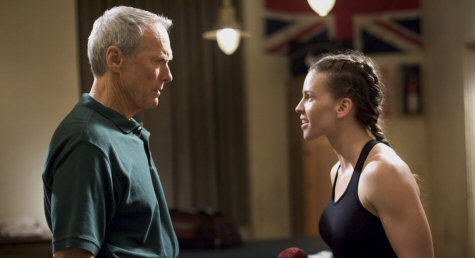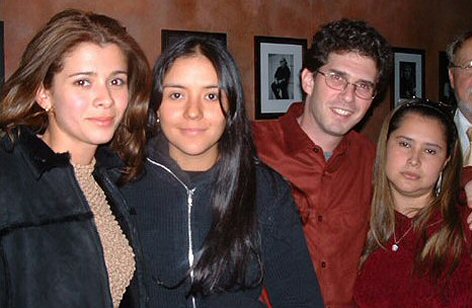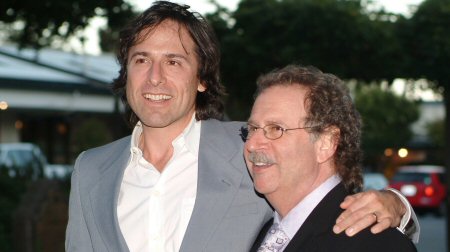New Yorker critic David Denby on Paul Giamatti’s sublime performance in Sideways, from a 10.18 posting : “Giamatti has no chin to speak of, a round-shouldered physique, an adenoidal snarl, and the nervous grin of a craven dog. He√ɬ≠s the national anti-ideal, and he√ɬ≠s making a brilliant career out of it. In American Splendor, as the cartoonist Harvey Pekar, he dragged his miseries around the deserted lots and slag heaps of Cleveland [and was] a genuine oddball. Miles is closer to common dreams and chagrins, and in this role Giamatti gives his bravest, most generously humane performance yet. Women may be repelled, but men will know this man, because, at one time or another, many of us have been this man.”
Month: October 2004
Two words
There are two words that describe the reported thinking among certain undecided voters out there, as relayed in a New York Times story out today (10.25), and those words are “staggeringly ignorant.” Perhaps the better adjective for ignorant is “willfully,” since the only way to support Bush in the face of all the damning indicators is to invest in massive levels of denial. The bad guys seem to be inching up, up, up…polls say Kerry is slightly behind in Hawaii, Florida, et. al. The New York Times says support for Bush among black voters is higher than it was in ’00….what?? Even the www.electoral-vote.com guy is sounding dispirited. The last hope is in the preferences of the newly registered and the under-30s, whom pollsters supposedly aren’t talking to.
Upsetting
“Closer is, I suppose, a Carnal Knowledge for 2004,” cinematographer Stephen Goldblatt has told San Francisco Chronicle columnist Hugh Hart. “It’s obsessed with sexual politics. It’s a quite upsetting, very adult drama, and [director] Mike Nichols is a fanatic about reality.” Glamour was not a concern. “When it worked dramatically, I wanted Julia Roberts not to look good,” he informs. “She was game. For one scene with Clive Owen that was very emotionally raw, she didn’t wash her hair, she wore no makeup at all. It was very much about the drama involved, so everything worked from the rehearsals and from the play.”
Multiple choices
The unfolding Paramount Classics situation boils down to this: (a) as run by co-presidents Ruth Vitale and David Dinerstein over the last six years, the division has been steadily profitable but not overwelmingly so, mainly due to financial-strategy restrictions placed upon Vitale-Dinerstein by former Paramount COO Jonathan Dolgen; (b) with Dolgen out as of last June, Viacom co-prexy Tom Freston has said he wants Par Classics to become a more dynamic, Fox Searchlight-resembling operation, and (c) in line with this, Paramount vice-chairman Rob Friedman is thinking about hiring John Sloss (the New York-based indie sales vet and producerís rep), former UA topper Bingham Ray or maybe distrib-marketing vet Danny Rossett to run a new, re-jiggered Paramount Classics, the basic idea being to focus more on production and building relationships with filmmakers. Great, but I donít get why Vitale-Dinerstein are being painted with the Dolgen brush. Hitting only bunts and singles wasnít their idea, and they know the ins and outs of the acquisitions game as well as Sloss, Ray or Rossett.
Just good entertainment
It was clear from an early John Logan draft of The Aviator, subsequently shot by director Martin Scorsese and the film now awaiting a Warner Bros. release on 12.17, that the resounding love affair in the piece isn’t between Howard Hughes and a woman (Cate Blanchett’s Katharine Hepburn, Kate Beckinsdale’s Ava Gardner, et. al.) but between Hughes and his flying machines. The longish film (a recent cut ran around 165 minutes) is also, apparently, buoyantly free of glumness or heavy-osity. “I know enough about it to say it is escapism, certainly for Scorsese,” says industry tipster Pete Hammond. “That doesn’t mean it’s comedy, but it doesn’t have the heavier feel of some of his other stuff. It’s all about Hollywood, aviation and the larger-than-life persona of the young Howard Hughes.” A publicist who’s seen the film told Hammond late last week this was a good way to describe the film, agreeing it’s “just good entertainment.” Blanchett is said to be quite robust as Hepburn, but wouldn’t that be a hard one to miss?
The challenge that inspired
“The challenge of taking on esteemed material has evidently inspired Alfie director [Charles] Shyer to shake off the bland and bloodless polish of his ultra-mainstream Hollywood pictures to inject this remake with welcome vitality,” writes Variety critic Todd McCarthy. “Shyer employs a jumpy, quick-cutting style he’s never used before. He also gets the dynamics among the characters right, is generous to his actors (all the actresses come off very nicely indeed) and guides Jude Law to an entirely engaging performance that does not so much compete with Caine’s as comfortably co-exist alongside it at a nearly four-decade remove. Many men meeting an Alfie in real life would no doubt be put off by his impossibly good looks and luck with women, but Law makes him entirely palatable company.”
Maybe Baby
Maybe Baby
Take this with a very small grain, but remarks from a couple of actresses have upped my interest in Clint Eastwood’s Million Dollar Baby (Warner Bros., 12.15).
Paul Haggis’s script is a surrogate father-surrogate daughter relationship piece. It’s about an aged ex-prize fighter (Eastwood) who decides to train a young woman (Hilary Swank) who’s determined to box. Morgan Freeman plays Eastwood’s longtime pal and confidante…the character with the pithy sayings and sage ringside commentary.
Haggis’s script is said to be based upon two short stories from the novel “Rope Burns,” by F.X. Toole. The plot has always sounded to me like a riff on Karyn Kusama’s Girlfight, with maybe a tad less emphasis on the girl boxer and a bit more on her trainer.
< ?php include ('/home/hollyw9/public_html/wired'); ?>

Clint Eastwood, Hilary Swank in Million Dollar Baby
Laura Linney, whom I interviewed last Monday regarding her just-opened film P.S. (Newmarket, 10.15) and who played a blue-collar Lady Macbeth in Eastwood’s Mystic River, has told me Million Dollar Baby is “really good.”
Linney said this with a certain conviction. Not in some deadly earnest, you-must-believe-me way, but in a tone of voice that said, “Well, yeah…of course…what else would you expect?”
An agent friend who sat down with Hilary Swank the other day says Swank is starting to think Eastwood might snag a Best Actor nomination for his portrayal of the haggard ex-boxer. Her remark wasn’t intended for journalistic absorption, so maybe she meant it.
This is all just talk, of course, but hearing these comments in the same week made me go, “Hmmm…maybe.”
You know going in that an Eastwood film will have a planted focused quality… that down-to-it, no-funny-stuff sensibility he brings to all his films. Maybe this will have a bit more.
The 12.15 Million Dollar Baby opening will be platformed — New York, L.A., Chicago, Toronto. It’ll break wide in January `05.
Ethnic Impurities
Easily, without question, Maria Full of Grace (Fine Line) is one of the best films released this year, one of the finest foreign-language movies I’ve ever seen, and a great woman’s film bar none.
Maria is one of those deserving indie flicks — quiet, character-driven, no stars, Spanish-speaking — that needs all the help it can get. A few Oscar noms in January would help.
The story’s about a poor, independent-minded 17-year-old girl from rural Colombia (Catalina Sandino Moreno) who accepts a gig as a drug mule in order to escape a dead-end life. Being a mule involves swallowing 60 or so sealed pellets of cocaine just before flying off to an American city (New York City, in this instance), and then crapping them out when she arrives. For this she gets $5000, minus expenses.
The film shifts into second gear when Maria embarks on her maiden voyage. On the same trip is Lucy (Giulied Lopez), an experienced mule whom Maria has befriended. Things get tense and then tenser, then somebody dies and tough calls have to be made.

(l. to r.) Maria costars Guilied Lopez, Catalina Sandino Moreno, director Joshua Marston, costar Yenny Paola Vega at Sundance Film Festival Fine Line party, January ’04
Joshua Marston, the film’s director-writer, wrote a totally solid script, and got superb performances out of each and every player, Moreno in particular. It seems especially remarkable that the U.S.-based Marston made Maria feel like an organic, hand-made Colombian right down to the bone.
His story is about Colombian characters, and wholly believable ones at that. 99% of it was acted in Spanish by a mostly Colombian cast, with slightly more than half of it filmed in Bogota, Colombia, and in Amaguacha, Ecuador. (A bit less than half was shot in Queens, New York, in the Colombian section of town, and on a set simulating a Manhattan-bound jet.) It’s a movie that looks brown, talks brown, thinks brown.
But it’s ineligible for a Best Foreign Language Film Oscar because the money and the behind-the-camera talent was too white.
This was essentially conveyed yesterday when the Academy of Motion Picture Arts and Sciences released their list of submitted foreign-language-feature entries.
Marston is a California Anglo (he went to the same high school as Angelina Jolie, Nic Cage, Lenny Kravitz, et.al.), a lot of the crew members were American, and four out of five companies that put up production cash were U.S.-based.
The Academy’s rejection of Maria Full of Grace as a Colombian film is “just technical,” says Fine Line marketing vp Marian Koltai-Levine. “It’s truly a technicality.”
The country of Colombia “supported it” and “wanted to submit it,” she adds.
Fine Line is unbowed, says Koltai-Levine. “We’re still running Academy campaigns on Catalina as Best Actress and Josh as Best Director, and Best Original Screenplay…we’re going for it.”
Foreigners
Which of the 49 films submitted for the Best Foreign Language Film Oscar have the most heat? I asked around yesterday, picked up some hints.
The two films most likely to be nominated are Alejandro Amenabar’s The Sea Inside (Fine Line), a Spanish-produced right-to-die drama with an Oscar-calibre lead performance by Javier Bardem, and Yimou Zhang’s House of Flying Daggers (Sony Pictures Classics), a visually operatic actioner from the Chinese director of Hero.
After these two it gets dicey.
Jan Hrebejk’s Up and Down, submitted by the Czech Republic, is said to be “a humanist cycle-of life” movie that “may play a bit too familiar…it’s good but has been done and seen before.”
Jorgen Leth and Lars von Trier’s The Five Obstructions, a Danish entry and a critical favorite at film festivals over the past year or so, is being dissed as too much of an elitist, smarty-pants exercise to draw any kind of groundswell support.

Bernd Eichinger’s Downfall, a German feature about the last days of Hitler (played by Bruno Ganz) in the Berlin bunker, is said to depict the Nazi leader in a way that may seem overly sympathetic (i.e., too vulnerably human) to industry mainstreamers, which, if true, means it’s toast.
The general Hollywood Jewish community rule is that Hitler can be portrayed only as a warhead of pure evil, straight from the molten caverns of hell. Downfall is based on the documentary Blind Spot: Hitler’s Secretary, based solely on the recollections of Traudl Junge, a Hitler assistant who was with him right to the end.
Nimrob Antal’s Kontroll, a Thinkfilm release from Hungary, ought to be one of the five. It’s a strong, stylistically nervy thing with a richly developed theme…except that Academy handicappers think it’s too strong and nervy, and they apparently feel the murky underground-subway milieu is a bit much. Go figure.
Brazil’s Olga, a true-life tale with a Holocaust undercurrent, is said to be shamelessly cornball, so it may have a chance. (HE’s Pablo Villaca wrote about this in his “Burden of Dreams” column two or three weeks ago — he said it was embarassing that the Brazilians bigwigs had submitted it.)
Timur Bekmambetov’sNight Watch, a big-budget submission from Russia, is kind of a Hollywood-style special effects fantasy thriller. A publicist tells me it’s set in present-day Moscow and is about “aliens who come down.” The IMDB says it’s about “forces that control daytime and nighttime doing battle.”
Night Watch has been a big hit in Russia, but will the Academy’s foreign branch want to salute a non-nativist Russian film trying to ape Big Hollywood? Fox Searchlight is releasing it sometime in ’05 — they couldn’t say when.
Blue Dog
I was finishing up the column this morning (10.22) and having a perfectly miserable time FTP-ing the photos when a Fed Ex guy came by with a package from Universal — a VHS of the new Meet the Fockers trailer. So I stopped working and popped it in.
Uh-huh, uhm-hmm, funny, funny, uh-huh…yeah, yeah, okay…whoa, FUNNY! A mix of toilet water and pet cruelty, and I was laughing for 15 or 20 seconds after the spot ended. I ran the tape three more times just to replay this one bit.
Except now it’s out there (I guess the trailer will be online before too long) and everyone will know about it going in, and so the movie won’t be quite as funny now.

That’s the trailer business for you — give away the money material in hopes that the audience will pay to see the film in order to get more. One hopes.
The invisible subtitle of this film is “Meet the Jews, Accept Them Into Your Family, and Sacrifice the Purity of Your Wonderbread Bloodline.”
The premise has been drilled into everyone’s head, but maybe someone’s been napping.
Having given their blessing to their daughter Pam’s (Teri Polo) wedding to neurotic male nurse Greg Focker (Ben Stiller), ex-CIA wacko Jack Byrnes (Robert De Niro) and wife Dina (Blythe Danner) travel to Detroit to meet the Greg’s touchy-feely liberal wacko parents, Bernie and Roz Focker (Dustin Hoffman, Barbra Streisand).
Meet the Fockers (Universal) opens on 12.22.
North, Part 2
Here I am finally writing about the entirely agreeable, smoothly run Mill Valley Film Festival, which I visited last weekend. It began on 10.7 and wrapped on 10.17…the usual ten days of screenings, q & a’s, parties, etc.
Mark Fishkin, the festival’s founder and executive director, picked up the phone last Sunday morning to suss things out a bit. The main subject was how Fishkin and his team managed to keep the festival going despite the collapse of the roof of one of the theatres inside the festival’s prime venue, Mill Valley’s Sequoia Theatre, in mid August.
The Sequoia’s owner, Century Cinemas, “was extremely optimistic that they could have it repaired before the festival began,” says Fishkin, “and the optimism was so great that there was no hint that it might not happen in time. As it was, we were told this about two hours before the press conference began.”
Century partly made up for this by providing two screens at the Century Northgate in northern San Rafael.


The rest of the festival schedule played at the first-rate San Rafael Film Center, which is owned and operated by the Film Institute of Northern California (also the parent org of the annual MVFF). The theatre is located on 4th Street in downtown San Rafael, and is know for its top-notch projection and sound quality. (I can attest to these personally.)
Switching everything around at the last-minute cost the festival an extra $20,000, says Fishkin.
I Heart Huckabees director David O. Russell showed up on opening night. Mike Leigh and likely Best Actress Oscar nominee Imelda Staunton dropped by to talk about Vera Drake. Alfred Maysles visited and gave a “master class” on documentary filmmaking. Laura Linney flew in for a day to talk about P.S.. Gena Rowlands stopped by, and so did Kinsey director Bill Condon.
Fishkin founded the MVFF in 1977. The festival has twelve regular staffers based in Mill Valley. The work force goes up to 27 or so in June, and then up to 100 during the festival run, along with the efforts of some 300 volunteers.

“It’s like making a movie every year, but you don’t end up with a negative,” Fishkin says.
Tom Luddy’s semi-secluded, non-competitive Telluride Film Festival was Fishkin’s inspiration when he started the MVFF in ’77. “Our atmosphere is still like that of a destination festival, but the numbers are more like an urban festival,” he says. The attendance this year was 40,000. The highest ever tally was 43,000.
Fishkin acknowledges the obvious fact that film festivals have exploded across the American landscape over the last decade. “First everyone wanted to write the Great American Novel, and then direct their own Hollywood movie,” he says. “Now everyone wants to manage their own film festival.”
Hell You Say
I nominate Tom Cruise to play the part of Lars Von Trier’s spiritually anguished American biologist in Antikrist,, which the provocative Danish helmer plans to shoot after finishing Manderlay, the second part of his Amerika trilogy.
In fact, I insist on this happening…even if Cruise can’t fit it into his schedule.
Peter Aalbek Jensen, von Trier’s producer, said earlier this week (I popped this into the WIRED column on Thursday morning) than the plan is to finish Antikrist in time to show it at the 2006 Cannes Film Festival.
This means Cruise probably can’t do it, since he’ll be making Steven Spielberg’s War of the Worlds and then Mission Impossible 3 through most of ’05. Because he’ll need to do something solemn and arty after these two, and a good von Trier would be just what the doctor ordered.

The Cruise idea is just a floater from Sweden, but von Trier is looking for a major American actor for the lead, and he went with Nicole Kidman for Dogville, so why wouldn’t he try for Cruise?
Jensen called Antikrist a “horror film.” Knowing von Trier, I’m guessing the horror will be more of a philosophical than a hair-raising thing.
Jensen told a Swedish reporter that Antikrist will “put an end to the big lie that God created the world,” and explore the more compelling view is that “it was Satan who created the human race and the world.”
There’s no script yet apparently, but according to a story in the Danish daily Berlingske Tidende , the plot will be about an American biologist who develops a fear of nature, finding it to be a place of evil, and starts seeking therapeutic help.
As Antikrist develops, von Trier’s theory of Satan being the true father and creator will be explored.
There’s a more detailed piece about this in the Swedish newspaper daily Dagens Nyheter .
Aristotle and Alexander
“Your question about whether Oliver Stone’s Alexander might capture “the bedrock faiths and realities of the time and culture in which he lived is a good one. But is Aristotle a significant player in the film? He should be. The `father of rational thinking’ certainly had a hand in creating the world conqueror, as he was Alexander’s personal tutor during his early teen years.
Aristotle believed in the City State idea, and this thinking was diametrically opposed to the philosophy Alexander later adopted. Aristotle believed that the Greek citizen was superior to others, and he held a condescending attitude towards other cultures, particularly Persians. Alexander came to embrace other cultures, albeit through conquest.
“When Alexander, in the name of cultural harmony, ordered several thousand of his Greek soldiers to take Persian wives, and to consummate their marriages by fornicating on the side of a hill, Aristotle must have come unglued. (I’ll bet that scene isn’t in the film).” — Ron Cossey, Studio City.
Distant Drum
“I’m not surprised that Charles Taylor hated Sideways I went to college with the guy (Connecticut College, class of ’83) and in those days he pretty much despised all contemporary filmmakers except Brian De Palma. (He put Dressed to Kill and blow out in the same category as The Godfather and Nashville.)
“I like Charlie and I think he’s a good writer, but calling Alexander Payne `a pretentious wiseass’ is like calling David O. Russell `formulaic.’ It makes him look stupid.” — C. Hashagen
Wells to Hashagen: DePalma acolytes are a weird bunch. They’re like born-again Christians. They’ve seen the light and you haven’t.
Roman Polanski, beware!
Roman Polanski, your legend is about to be challenged. Before shooting Washington, the third and final installment of his Amerika trilogy, Lars von Trier is going to make some kind of classy horror film about the Devil. To be called Antikrist, it will √ɬ¨put an end to the big lie that God created the world, according to von Trier’s producer, Peter Aalbek Jensen, and will explore von Trier’s contrarian view that ¨it was Satan who created the human race and the world. There’s no script yet apparently, but according to a story in the Danish daily Berlingske Tidende , the plan is for the amply-budgeted, digitally-shot, English-language film to be completed in time for showing at the 2006 Cannes Film Festival. The plot will be about an American biologist (probably to be played by a big-name American actor) who develops a fear of nature, finding it to be a place of evil, and resultantly seeks out therapeutic help. As Antikrist develops, von Trier’s theory of Satan being the true father and creator will be explored. (There’s a more detailed piece about this in the Swedish newspaper daily Dagens Nyheter .)
Ancient Tides
Ancient Tides
The fundamental yea-nay on Oliver Stone’s Alexander (Warner Bros., 11.25) will hinge, I’m guessing, on one basic thing.
Has Stone sufficiently channeled the times of Alexander — the beliefs and core values that provided a sense of identity, cohesion and destiny to players in the period from 356 to 334 B.C.? Has Stone sufficiently imbedded his film in the bedrock faiths and realities of that time and culture?


And in so doing (that’s if he’s accomplished this), has Stone resisted inevitable studio pressures that he (a) reimagine Alexander’s life so it unfolds in synch with the attitudes of 2004 youths, and (b) that he adopt a competitive video-game attitude in the shooting of action scenes (i.e., make it play like The Matrix by stuffing in all kinds of inorganic CG crap, like Wolfgang Petersen did here and there in Troy).
In short, if Stone has shown more loyalty to the legend of Alexander than to his own fortunes, the movie will probably satisfy.
< ?php include ('/home/hollyw9/public_html/wired'); ?>
I’m thinking this way because I watched the new MGM Home Video DVD of Robert Rossen’s Alexander the Great on Tuesday night. There are some vaguely underwhelming or unsatisfying elements in this 1956 film, but it does feel like some kind of realistic visit to a long-gone ancient era, and not just some 1950s Eisenhower-era revamp.
It’s interesting (and perhaps encouraging) that the same basic theme has been used in Stone and Rossen’s films.
The marketing slogan for Alexander is “fortune favors the bold.” Rossen’s film begins with the voice of his Alexander (i.e., Richard Burton) saying, “It is men who endure toil and dare danger who achieve glorious things. And it is a lovely thing to live with courage and to die leaving behind an everlasting renown.”
Rossen delivers a truly riveting scene around the two-thirds mark, following Alexander’s defeat of the Persian forces led by Darius.
Knowing they’ve been beaten and not wanting to be executed, a few top-level Persian officers kill Darius as a kind of warped tribute to the victor. A few hours later Alexander arrives and finds the slain body of Darius. He assembles some captured Persian officers and stands before them. Here’s how the scene plays from here on:

Alexander: Let the man who slew my enemy come forward, for I seek to honor him.
No response.
Alexander: Let him fear not, for I swear by the gods and by the life of my mother Olympias that I will make him renowned and exalted over my troops.
A Persian general clops forward a step or two on horseback.
Alexander: Why did you betray, make prisoner and finally murder Darius?
Persian general: I did not act alone! We all agreed that such an act would win favor in your eyes.
Alexander: And the crown of Persia which you had the arrogance to place upon your head. You won hatred and death.
Persian general: You swore falsely!
Alexander: No. You. For he was both your lord and your kinsman, and you swore loyalty to him. I repeat my oath. You will be exalted above my troops. Impaled upon a stake and there be left for all men to see and remember that only a king may slay a king.
Ben Agonistes
I’ve been feeling sorry for Ben Affleck for a while now. And now he’s gone from being a guy in need of career corrections to a man sinking in quicksand.
After the indisputable triumph of his Changing Lanes performance two and half years ago, the impression (if not the actual economic reality) is that Affleck has been in one thud-like film after another — Gigli, Daredevil, The Sum of All Fears, Paycheck, Jersey Girl.
And God help him, but he may never get that Jennifer Lopez relationship skunk-smell off his clothes. It’ll take ten years for people to forgive him for that…if ever.

And now there’s Surviving Christmas (DreamWorks, 10.22), which has the earmarks of another wipe-out.
I missed the screening earlier this week, but a respected Los Angeles critic who didn’t told me yesterday that it’s close to being a total failure.
The printed reviews so far haven’t been Gigli-level, but they’re in the vicinity.
Village Voice critic Jessica Winter is calling it “a horror show….a ghastly comedy [emitting] the subliminal whine of a sucking chest wound,” adding that “the sorriest sight is Affleck himself, who helplessly yelps, mugs, and bugs his eyes, his face frozen in a panicked rictus as if J.Lo were screaming at him from off-camera to bring her cuticle cream.”
And Cinema Blend’s Michael Brody has called it “an offensive, unfunny lump of coal masquerading as a charming stocking-stuffer.”
Affleck plays a well-off guy who tries to reconnect with old Xmas memories by paying a family occupying his former childhood home $250,000 to let him stay with them during the holidays.
I know all about this. That’s partly why I don’t want to see Surviving Christmas. We all want what we used to feel about Christmas when we were nine years old. The answer to this is “bah, humbug.” Get in touch with your inner Scrooge McDuck and ignore those f***ing sleighbells. It’s the only way. I look at Xmas the way I look at Abraham Lincoln’s birthday.
The only good thing Affleck has done in a long while was play political commentator on MSNBC and CNN in Boston during last summer’s Democratic National Convention. He was fantastic in that guise. It almost felt like a rebirth.

I’m totally serious in suggesting that Affleck run for President ten or fifteen years from now. By the time he’s in his mid 40s the country will be ready. If Reagan can do it, so can Ben, and he’s got a few million more brain cells than Reagan ever had. He should run in either 2016 or 2020.
There is one hopeful Hollywood sign on the horizon right now. Affleck’s next feature is Man About Town, about a Hollywood talent agent whose groove comes undone when he discovers his wife is cheating on him and that his journal has been swiped by a reporter out to trash him.
I’m encouraged for two reasons. One, it sounds like there’s a Changing Lanes dynamic in this (i.e., a chance to play another yuppie prick suffering a life crisis). And two, the writer-director is Mike Binder, whose most recent film, The Upside of Anger (New Line, early ’05), is well thought of.
Sputtering
My car — a 1991 Nissan 240 SX — has seen better days. It’s lately become a metaphor for my daily Hollywood Elsewhere routine. It has a cool-looking hot-car facade with a sputtering engine desperately in need of a good mechanic. Better yet, I need a visit from the makeover artists with MTV’s Pimp My Ride. Yeah, I know…they only upgrade beaters belonging to under-25s.
My car starts up decisively and has a fair amount of power, but it needs a lot of valve work. The timing is off. You should hear it try to impress the other cars when we’re sitting at a light…impress them by not stalling out, I mean. But the black paint job looks moderately cool and presentable as I’m rolling down Beverly Boulevard.
Sometime later today (Wednesday, 10.20) I have to transcribe a hotel-room interview I did yesterday with Laura Linney, and then a couple of audio-taped interviews I did with the Sideways crew up in Santa Barbara a few weeks back.

Sideways finally opens this Friday, but I think I should leave this alone. I’m kind of Sideways-ed out at this stage. If I say one more time it’s one of the year’s finest films and an absolute must-see, somebody out there might get resentful and some kind of ripple effect could kick in.
All right, here’s my last Sideways plug.
It’s possible to resent a film without having seen it. I feel this way about Peter Jackson’s King Kong and it’s only three or four weeks into shooting.
I wanted to vent my suspicions about this film with a column called “Kong Watch,” but I was strong-armed into submission by Jackson goons who told me bluntly that if I ran “Kong Watch” I would suffer greatly. Jackson can put out those online video reports about the progress of filming down in New Zealand all he wants, but a contrary view from me and it’s off to the rack.
I will not be silent. Beware this film. Beware the body-suit acting of Andy Serkis. Beware Jack Black’s balls-to-the-wall Carl Denham. Beware any director of a Kong remake who’s said he wanted to give the line “it was Beauty who killed the beast” to the late Fay Wray. Beware these things and more.
That Sinking Feeling
“Grow some cojones about the election, will ya? Jeez, every week you get all weak-sister about how `Oh, my, the election is over. The Dems are losing it,’ etc. The one losing it is you.
“Here are three things to consider to help you grow some hair on your balls, for fuck’s sake:
“(1) Yes, undecideds/swing voters tend to break for the challenger.
“(2) A recent electoral tally put it at 175 Kerry, 169 Bush, and each getting 63 from states said to be leaning towards one or the other. Then comes the 16 battleground states, where in recent polls Kerry has been on top in 13 of them.
“(3) This year will set a record for newly registered voters, millions from two very key groups, youth and minorities, that historically get missed in polls. Think Minnesota ’98. Mark my words, come Nov. 3rd you’re gonna see a helluva lot of new stories that everybody should have looked more closely at this.” — Kenny NotG.
“Relax, Jeffrey. All is well. Go to electoral-vote.com. Our boy is in fine shape. This is shaping up to be the exact inverse of 2000, in that Bush may win the popular vote and lose the electoral college, in one of the greatest cosmic fuck-you’s of all time. We’re going to prevail. Good always triumphs over evil…c’mon. Don’t you believe in the pictures anymore?” — David Koepp, director-screenwriter (War of the Worlds, Secret Window).
Trip North
Apologies to Mark Fishkin, executive director of the Mill Valley Film festival, but the story I was going to run in today’s column about my visit there last weekend will have to wait until Friday. The guy you told me to e-mail about photos never got back to me.
Here’s a shot taken Sunday afternoon of my rental car parked on the side of Route 25. I was on my way back to Los Angeles when I was suddenly hit with a massive urge to pull over and go to sleep. I did just that and conked out for 45 minutes.
The other two pastoral shots are of crop fields a couple miles east of San Juan Batista. The final one was taken at the corner of Larabee and Sunset on Sunday evening, about an hour after I returned.




Wooden sex with strings attached
From Bill Maher’s “New Rules” routine on last Friday’s (19.15) “Real Time with Bill Maher” HBO show, to wit: “New Rule: No puppet fucking. The South Park guys have a new movie called Team America, which features graphic sex scenes between marionettes. Hey, you know what? If I had any interest in wooden sex with strings attached, I’d get married.”
… But those first five minutes are great!
Natalie Portman’s striptease-club scene in Closer will, I’m told, be cause for hormonal excitation among younger males, particularly those who haven’t seen her in Garden State (in which she gives a wonderfully ripe and robust performance)and who know her primarily as Princess Amidala. I don’t know what I can add to this, except to say that strip clubs are very exciting places to be for about five minutes…until that rancid predatory vibe starts to seep into your pores and you can’t wait to leave. But those first five minutes are great.
An English lad and an American lassie
Another totally detestable movie idea being developed by Joe Roth’s Revolution Studios: a Beatles film musical called “All You Need Is Love,” currently being written by Brit screenwriters Dick Clement and Ian La Frenais. Pic would use well over a dozen cover versions of Beatle songs to “drive the narative” of a love story between an English lad and an American lassie, set against the backdrop of the social upheaval of the 1960s.
If this thing ever gets made, it could one day share the marquee of West Hollywood’s New Beverly cinema with Sgt. Pepper’s Lonely Heart Club Band.
